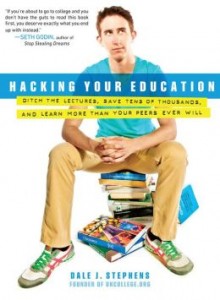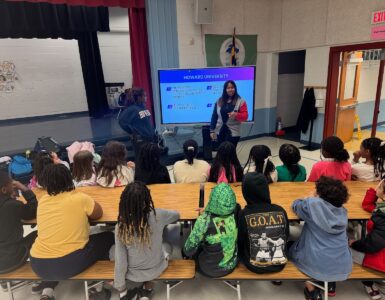As college students, we know the drill.
We go to class, and work hard for an ‘A.’ We beef up our resume as much as possible so that after we graduate, we can go get that job, and be well on our way to success in our career.
But what if that wasn’t the only option? What if there was a way to have a successful career and be financially stable without going to school?
According to Dale Stephens, there is. He is an unschooler, part of a growing number of people who forego traditional education in favor of self-learning. Stephens was “unschooled” from sixth to 12th grade.
Unschooling refers to the method that allows children to learn through natural life experiences like household responsibilities, work, social interaction and even play. John Holt, an education activist, is considered the founder of the unschooling movement. He first coined the term in the first issue of Growing Without Schooling, a magazine he began publishing in 1977 that focused on teaching children at home. Now Stephens leads the UnCollege movement, which focuses the principles of unschooling to higher education. The UnCollege movement encourages students to “hack their education” and explore options other than traditional school.
It is difficult to pinpoint the number of unschoolers in America. In 2007, 2.9 percent of American students were homeschooled, according to figures from the Digest of Education Statistics, a publication of the U.S. Department of Education. Unschoolers often get lumped into that number.
“Most people don’t know what unschooling is or they mistake it for homeschooling,” says Nicholas Scalice, 24, who also left public school for unschooling at an early age. Although both are considered methods of home-based education, there is a distinction between the two. Homeschooling is considered more structured, with set curriculums and tutors or parents as teachers. Unschooling focuses less on a structured learning environment and more on a child’s natural curiosity to learn.
Scalice chose to stop unschooling attend college. He got a bachelor’s degree from Florida Atlantic University and is now in the Master’s program there. Although he loved his college experience, he credits most of his learning came from out-of-class experiences.
“I think that the best part of college has more to do with our involvement on campus than in the classrooms,” Scalice says. “For instance, I am involved with student government at my campus and looking back on my undergraduate years. This, I believe, has taught me more than any particular class.”
Stephens enrolled at Hendrix College in Arkansas, but quickly realized the college environment was not for him. He left Hendrix and applied his unschooling background to higher education, launching UnCollege in January 2011. UnCollege now has over 5000 members in six different countries. The movement is not a call for all students to drop out of school- in fact, Stephens said his team is meeting with administrators next month at several universities including Pepperdine, Cornell and Northwestern.
“There’s no question that a college degree is important,” Stephens said. “Hopefully we will begin to work with these institutions that prepare students for the real world. There are increasingly opportunities for students to gain credentials without gaining a college degree and companies that hire people based on their work.”
Stephens hopes to encourage educational institutions to help students acquire the practical experience necessary to succeed after college, “so they emerge with more than just two letters after their name.”
One of the complaints of unschooling is that an unstructured educational experience puts students at a disadvantage when it comes to getting a job.
Anna Matlock, 20, a pre-law student at Belmont University, values structure in education.
“I think there is a benefit in having a structure in the education system,” Matlock says. “Structure is there for a reason. Employers will value a traditional education over unschooling.”
Phenesse Dunlap, a junior studying anthropology at Washington University agrees that traditional school leads to more career opportunities.
“I think that the job market for unschoolers would be very limited,” Dunlap says.
Both Scalice and Stephens say that this is not the case. Scalice’s first job was at a national health club chain as a membership counselor. He says although he came from an unschooling background, he had little difficulty convincing employers he was right for the job.
“My employers were very accommodating and did not think differently of me due to my educational background. They saw that I was willing to work hard and that I was a fast learner,” Scalice says.
Within the first two months, he was promoted to a senior position. Now Scalice runs FastBlink, a business that specializes in social media marketing and web development.
Stephens similarly found success as a self-starter. According to Stephens, the reception to UnCollege has been phenomenal, and he has written a book to promote non-traditional methods of education. The book, titled Hacking Your Education, serves as a guide for students to cultivate skills that cannot be learned in the classroom such as initiative, passion and emotional intelligence, and will teach them how to use those skills for success.

According to Stephens, employers are not the people who present the greatest opposition to unschooling. He says he receives the most opposition from students, who feel that what he is doing threatens their success.
Dunlap does not feel threatened by unschooling, but is not convinced of its effectiveness either.
“To an extent it might be ok,” Dunlap says. “But in order to have a career that will most likely sustain you through economic hardships, a formal education would be more beneficial.”
Matlock feels the same way.
“I feel like not everyone will want or even know about unschooling,” Matlock says. “People still want the traditional college experience.”
Stephens eventually hopes to see a world where everyone is unschooled.
“We aren’t at the point where society is ready to accept us,” he says. “Unschooling is not sitting at home in your pajamas all day. I’d love everybody to direct their own education so when it comes time to step away and live your own life you won’t flounder, because you’ve been directing yourself all along.”










Recent Comments